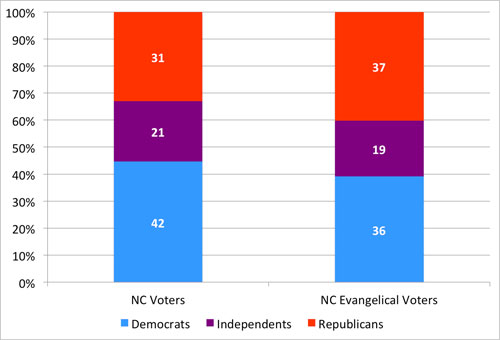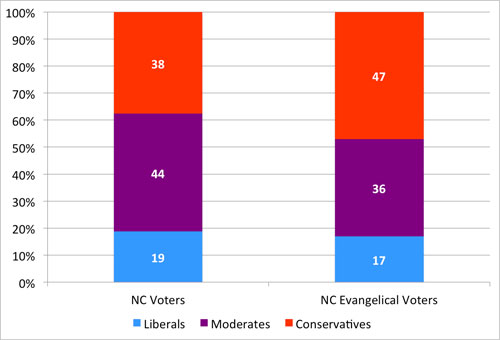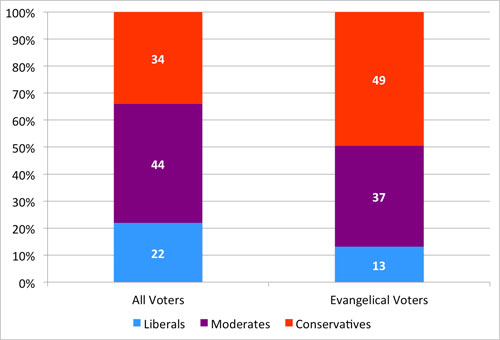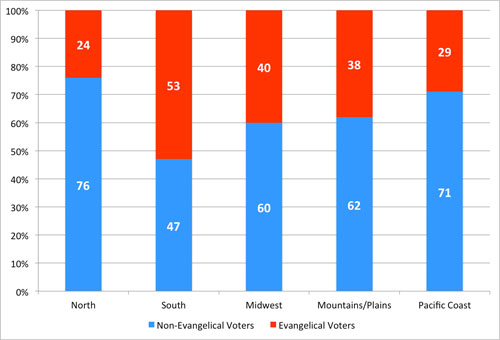A short piece about North Carolina evangelicals beginning to organize themselves for the upcoming elections recently caught my attention. Led by former state Rep. Robert Brawley of Mooresville, the NC Chapter of the Faith and Freedom Coalition said that candidates “cannot afford to ignore these voters and their issues this election cycle.”
So far in the GOP presidential contests, Brawley noted that half of Republican voters identify themselves as evangelicals. But who are evangelical voters, and how might they impact North Carolina’s elections?
Based on the 2008 presidential exit polls, I took a look at various aspects of those who identify themselves as evangelical voters. In the national electorate, 39 percent of all national voters identify themselves as born-again or evangelical Christian voters, and the automatic assumption is that evangelicals are white voters.
But in the 2008 national exit poll, only 36 percent of white voters identified themselves as evangelicals, but 62 percent of black voters did. Granted, whites make up a consistent majority of the national electorate, but the responses by black voters is something that may have an impact here in North Carolina’s future electoral contests—more on that later.
Among those national voters who said they were evangelical, the ideological and partisan break-downs are, as one would expect, more conservative, more Republican, and more likely to be Southern than the national electorate.
In 2008’s national electorate, moderates demonstrated their strength in numbers by claiming 44 percent of all voters. But among voters who identified as “evangelicals,” nearly half—49 percent—identified themselves as conservative in their ideological perspective.
In looking at party identification, while the national electorate in 2008 saw a slight plurality to Democrats, Republicans were the plurality party among those who identified as evangelicals nationally.
When looking at each region in the United States, it is the South, and only the South, that sees a majority of its voters identify as evangelicals.
Here in North Carolina, a similar pattern emerges with evangelical voters compared to the Tar Heel electorate as a whole.

2008 North Carolina Presidential Exit Poll Results for Party Identification among All NC Voters and NC Evangelical Voters
Among all North Carolina voters, a plurality of voters identify as Democratic, but among Tar Heel evangelicals, Republicans have a 1-point advantage over Democrats.
Ideologically, the state tends to be moderate, with a slight “center-right” tilt due to the fact that conservatives outnumber liberals 2-to-1. But among North Carolina evangelical voters, conservatives make up nearly half the group.

2008 North Carolina Presidential Exit Poll Results for Ideology among All NC Voters and NC Evangelical Voters
When looking at evangelicals broken down by race, we see that 62% of white North Carolinians describe themselves as born-again or evangelical Christians, with white evangelicals voting for McCain by a three-to-one margin. In comparison, white voters who didn’t identify themselves as evangelical voted for Obama, 51-48.
Among North Carolina black voters, 69% identified themselves as born-again or evangelical Christians, slightly more than the national numbers of 61% of black voters who describe themselves as born-again or evangelical Christian.
While the Faith and Freedom Coalition would tend to focus on mobilizing white evangelicals, especially for the May constitutional amendment vote defining marriage, it will be critical to watch the voting pattern of black voters on this issue. Will they see it as a social, evangelical issue that makes them more likely to vote for the amendment, or will they see it as a civil rights issue, a deep-seated legacy of North Carolina black voters, with the likelihood that they would vote against it?
We have never seen a serious white-black coalition in North Carolina politics since the days of Fusion Politics in the 1890s, but the vote on gay marriage amendment in 2012 has the potential to make strange bedfellows of voters this May.









Pingback: Rick Warren’s Not Willing To Call Mitt Romney a Christian | SPH - Small penis humiliation